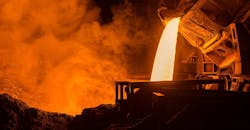Japanese Steel Mills to Spend Billions to Fend Off Arcelor
Japan’s two biggest steelmakers expect to spend more than $20 billion in the next three years to revamp plants, expand production of high-quality metal for electric vehicles and boost operational efficiency to fend off rivals such as ArcelorMittal, Posco and producers in China.
JFE Holdings Inc., the second-largest, will shell out more than $6 billion over the period, Executive Vice President Shinichi Okada said in an interview. Nippon Steel & Sumitomo Metal Corp., the biggest, outlined a plan just last week to raise capital expenditure by 35% to about 1.7 trillion yen (US$16 billion).
The producers are investing some of their bumper profits to refurbish aging mills built in the postwar boom as they strive for an edge over foreign rivals including mills in China, which supplies more than half of the world’s steel. They’re also preparing for rising demand from new energy vehicles and the 2020 Olympics. Nippon Steel and JFE get about a third of their sales from exports, while as a country, Japan vies with India as the No. 2 producer.
“We won’t be able to survive in global markets unless we make our mills competitive,” Okada said in Tokyo on Tuesday. “We assume high levels of capital expenditure,” he said, adding the total will exceed the 650 billion yen that was planned for the three years ending this month.
To keep pace with demand, JFE plans to raise local output to 30 million metric tons from 28 million tons in coming years, Okada said. The company will make more high-quality steel for the auto industry and move production of general-use construction metal to lower-cost nations in Asia, he said. JFE’s expanding in places such as India, Vietnam and Myanmar through local partners.
Tariff Impact
Okada expects healthy market conditions in Asia to continue until at least the end of the first half of the country’s financial year in September as capacity cuts and pollution curbs in China limit production and constrain exports.
While it’s too early to properly assess the outcome of President Donald Trump’s plan for a 25% import tariff on steel, Okada’s concerned that the move will have a “big impact” on the global economy as countries retaliate on products beyond metals. Kosei Shindo, steel federation chairman and president of Nippon Steel, has already said the duties risk opening a Pandora’s box of retaliation that could go well beyond the industry.
Nippon Steel shares have lost 16% in the past year and closed at 2,359.5 yen in Tokyo Thursday, while JFE is up 7.7% in the same period.
By Masumi Suga and Ichiro Suzuki
About the Author
Bloomberg
Licensed content from Bloomberg, copyright 2016.
